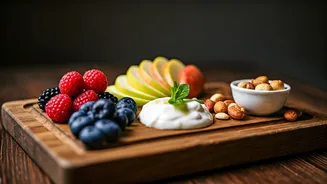Unlock the secrets of mindful eating & portion control! Learn to savor every bite & nourish your body effectively
In Bharat, where food is often associated with celebration and togetherness, managing portion
sizes can seem like a challenge. We love our thalis overflowing with delicious dishes, but sometimes, those generous servings can lead to overeating and health woes. But worry not!
The good news is that understanding the science behind portion control and adopting mindful eating habits can help us enjoy our favourite foods without compromising our well-being. It's all about finding that sweet spot between satisfaction and health!
Understanding hunger cues crucial for portion control; slow down, savor to eat less
One key aspect of portion control lies in understanding our body's hunger cues. Our stomach has stretch receptors that send signals to the brain when it's full. However, it takes about 20 minutes for these signals to register.
That's why eating quickly can lead to overeating – we don't give our brain enough time to realize we're satiated. Mindful eating encourages us to slow down, savour each bite, and pay attention to these internal signals.
By doing so, we can stop eating when we're comfortably full, rather than stuffed to the brim. This simple shift can make a significant difference in our overall calorie intake and prevent that sluggish feeling after a heavy meal.
Understanding visual cues key to portion control; use smaller plates, utensils
Another crucial factor is understanding visual cues. Studies have shown that we tend to eat more when presented with larger portions. This is because our brains are wired to associate larger servings with greater value. To counter this, try using smaller plates and bowls.
This simple trick creates the illusion of a larger portion, helping us feel satisfied with less food. Additionally, be mindful of the size of serving spoons and ladles. Using smaller utensils can also help control the amount of food we dish out onto our plates.
Remember, our eyes can often trick us into overeating, so being aware of these visual influences is essential for effective portion control.
Emotional triggers impact eating habits; recognize and address them for healthier choices
Beyond physical cues, our emotional state also plays a significant role in our eating habits. Stress, boredom, or sadness can often trigger emotional eating, leading us to seek comfort in food. Unfortunately, these emotional cravings often lead to unhealthy choices and overeating.
To combat this, identify your emotional triggers and develop alternative coping mechanisms. Instead of reaching for a snack when stressed, try going for a walk, listening to music, or talking to a friend.
By addressing the underlying emotions, we can break the cycle of emotional eating and make healthier food choices. Similarly, avoid eating directly from large packets of snacks. Divide them into smaller, pre-portioned bags to prevent mindless munching.
Plan meals ahead for portion control, choose wisely eating out
Planning our meals ahead of time is another effective strategy for portion control. By preparing our lunches and dinners at home, we have greater control over the ingredients and portion sizes. When eating out, be mindful of restaurant portions, which are often larger than what we need.
Consider ordering an appetizer instead of a main course, or sharing a dish with a friend. Don't be afraid to ask the server to pack up half of your meal before you even start eating. This way, you can enjoy your food without feeling pressured to finish everything on your plate.
Remember, it's perfectly okay to leave food behind if you're feeling full.
Small, sustainable changes lead to successful portion control
Making small, sustainable changes to our eating habits is key to achieving long-term success with portion control. Start by focusing on one or two strategies at a time, such as using smaller plates or slowing down while eating. Gradually incorporate other techniques as you become more comfortable.
Remember, it's not about deprivation or restriction, but about finding a balanced approach that allows you to enjoy your food while nourishing your body. Be patient with yourself, and celebrate your progress along the way. Developing mindful eating habits is a journey, not a destination.
Importance of balanced meals for portion control and health
Finally, remember the importance of balance. While portion control is essential, it's equally important to ensure that our meals are balanced and nutritious. Focus on filling your plate with plenty of fruits, vegetables, whole grains, and lean protein.
These foods are not only packed with essential nutrients but also tend to be more filling, helping you feel satisfied with smaller portions.
Avoid processed foods, sugary drinks, and excessive amounts of unhealthy fats, as these can sabotage your efforts to control your portions and maintain a healthy weight. Prioritize wholesome, home-cooked meals whenever possible to nourish your body and mind.













